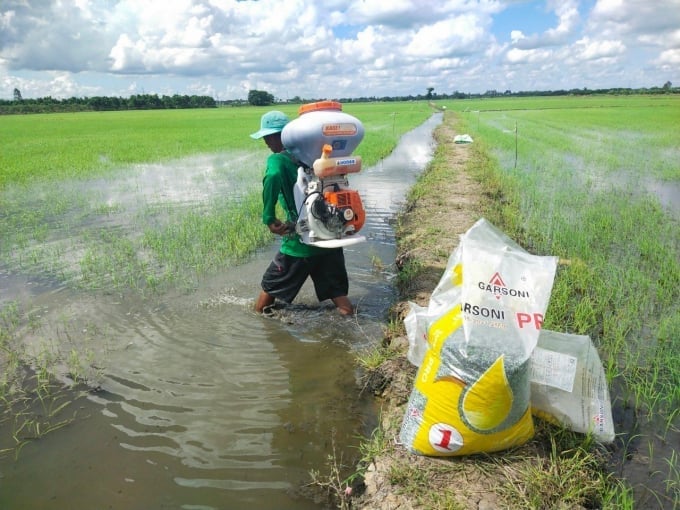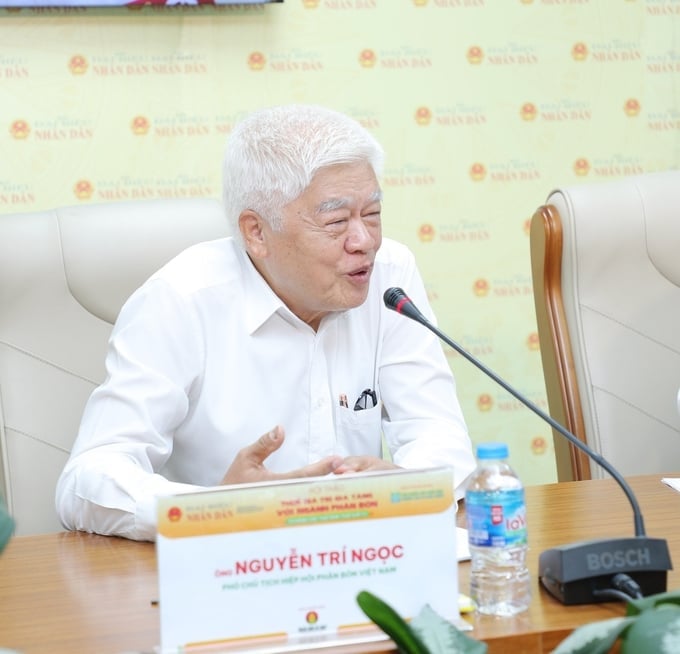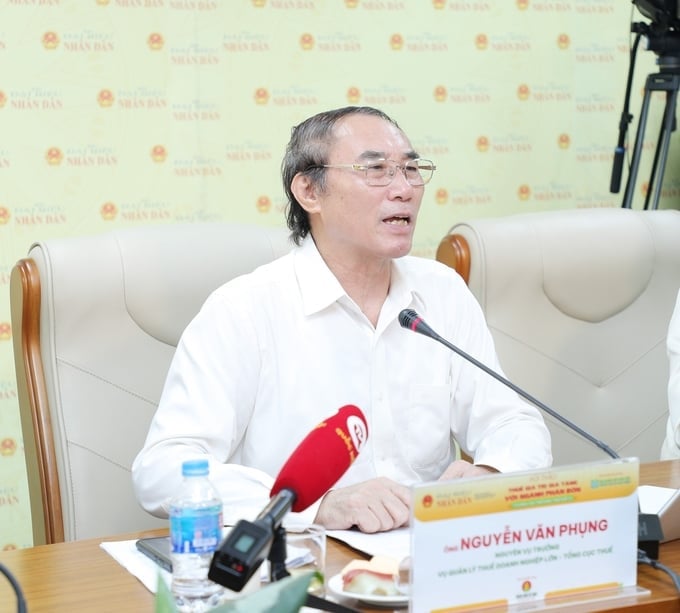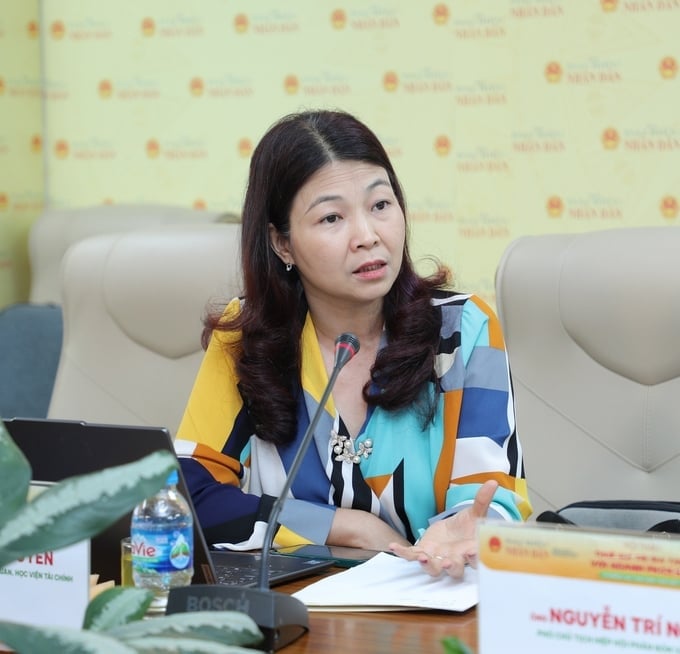November 23, 2025 | 08:09 GMT +7
November 23, 2025 | 08:09 GMT +7
Hotline: 0913.378.918
November 23, 2025 | 08:09 GMT +7
Hotline: 0913.378.918

A 5% value-added tax rate on fertilizer products aims to facilitate equal treatment between domestically produced and imported fertilizers.
The People's Deputies Newspaper, in collaboration with the Institute for Brand and Competitiveness Strategy, organized a seminar titled "Value-Added Tax on Fertilizers: From Tax Exemption to 5% Taxation." The event was held on July 16 in Hanoi city.
The seminar gathered the opinions of experts and delegates to the National Assembly who contributed suggestions to improve policies with the aim of protecting the interests of farmers and promoting the development of domestic fertilizer manufacturers towards a sustainable, safe, and environmentally friendly agricultural sector.

Nguyen Tri Ngoc, Vice Chairman of the Vietnam Fertilizer Association. Photo: Minh Ha.
According to Nguyen Tri Ngoc, Vice Chairman of the Vietnam Fertilizer Association, fertilizers directly affect farmers as they constitute between 30 and 50 percent of agricultural production input costs.
Consequently, Vice Chairman Ngoc emphasized the necessity of subjecting fertilizers to value-added taxation. The current tax exemption policy creates inequality between domestic manufacturers and import businesses; and results in tax revenue losses for the government, without benefiting farmers.

Nguyen Van Phung, former General Director of the Tax Department of Large Enterprises at the General Department of Taxation. Photo: Minh Ha.
Nguyen Van Phung, former General Director of the Tax Department of Large Enterprises at the General Department of Taxation, expressed agreement with the Vietnam Fertilizer Association, and outlined the following reasons:
The implementation of the value-added tax complies with the National Assembly's directive to reduce the list of 26 groups of goods and services currently exempt from VAT.
Furthermore, subjecting fertilizers to value-added taxation aims to establish a connection between the government, the business community, and farmers, with a focus on promoting overall economic interests.

Prof. Dr. Ly Phuong Duyen, Senior Lecturer at the Tax and Customs Faculty, Academy of Finance. Photo: Minh Ha.
As an independent expert, Prof. Dr. Ly Phuong Duyen, Senior Lecturer at the Tax and Customs Faculty, Academy of Finance, supports the transition from VAT-exempt to VAT-applicable goods for fertilizer products, which also complies with the government's goal of expanding the tax base.
The management of fertilizer products through value-added taxation aims to prevent tax erosion, stabilize revenue collection, and facilitate equal treatment between domestically produced and imported fertilizers.
According to Prof. Dr. Ly Phuong Duyen, a 0% VAT rate will fully exempt input taxes, which significantly benefits consumers and businesses. However, it poses challenges for state budget revenue offsetting. Consequently, a 5% VAT rate is currently the most feasible option for all parties involved.
Phan Duc Hieu, Standing Member of the National Assembly's Economic Committee, outlined several scenarios regarding the implementation of a 5% VAT rate on fertilizers.
For businesses, this tax rate presents an opportunity to reduce production costs (capital, materials, machinery, equipment, etc.) through VAT input tax deductions. Notably, domestic businesses stand to benefit from the promotion of local production activities, as imported fertilizers will incur an additional 5% VAT.
For consumers, reduced production costs for domestic businesses may potentially lead to corresponding price reductions.
Phan Duc Hieu also noted that the 5% VAT rate can potentially increase state revenue by over 4,000 billion VND.
All delegates at the seminar agreed on the transition from VAT-exempt to VAT-applicable goods for fertilizer products. While a 0% VAT rate is considered highly ideal, a 5% VAT rate is deemed the most feasible option when considering the comprehensive interests of the government, the business community, and farmers.
The government recently issued Decree No. 72/2024/ND-CP dated June 30, 2024, which stipulates the policy for reducing value-added tax in accordance with Resolution No. 142/2024/QH15 issued by the National Assembly on June 29, 2024.
The Decree specified a reduction in VAT rate for goods and services currently subject to a 10% tax rate, with exceptions for the following categories:
Telecommunications, financial services, banking, securities, insurance, real estate business, metals and fabricated metal products, mineral products (excluding coal mining), coke, refined petroleum products, and chemical products, as detailed in Appendix I of the Decree.
Goods and services subject to special consumption tax, as detailed in Appendix II of the Decree.
Information technology products and services, in accordance with the Information Technology Law, as detailed in Appendix III of the Decree.
Translated by Nguyen Hai Long

(VAN) Viet Nam’s forestry sector is undergoing a comprehensive transformation, strengthening management, protection, and development efforts to maintain ecological security and drive green, sustainable growth.

(VAN) Viet Nam is accelerating efforts to digitize reservoir operations, from real-time data to hydraulic modelling.
/2025/11/21/3348-2-102623_454.jpg)
(VAN) National Assembly delegate Nguyen Thi Lan has proposed adding special mechanisms to attract human resources to the agricultural, forestry, and fishery sectors, addressing the shortage of high-quality personnel.

(VAN) Over the past two decades, the unified legal framework for water resource management has been perfected, becoming a crucial foundation for ensuring national water security.

(VAN) The land-data cleansing campaign in Dien Bien is entering its final stretch, yet weak infrastructure, limited personnel and fragmented multi-period datasets continue to create major obstacles.
/2025/11/20/0204-2-115235_496.jpg)
(VAN) Not only do carbon credits bring a great revenue source, but they also contribute to better forest protection and development. However, this potential remains largely untapped.

(VAN) Applying modern technology is helping environmental monitoring and oversight of management quality.